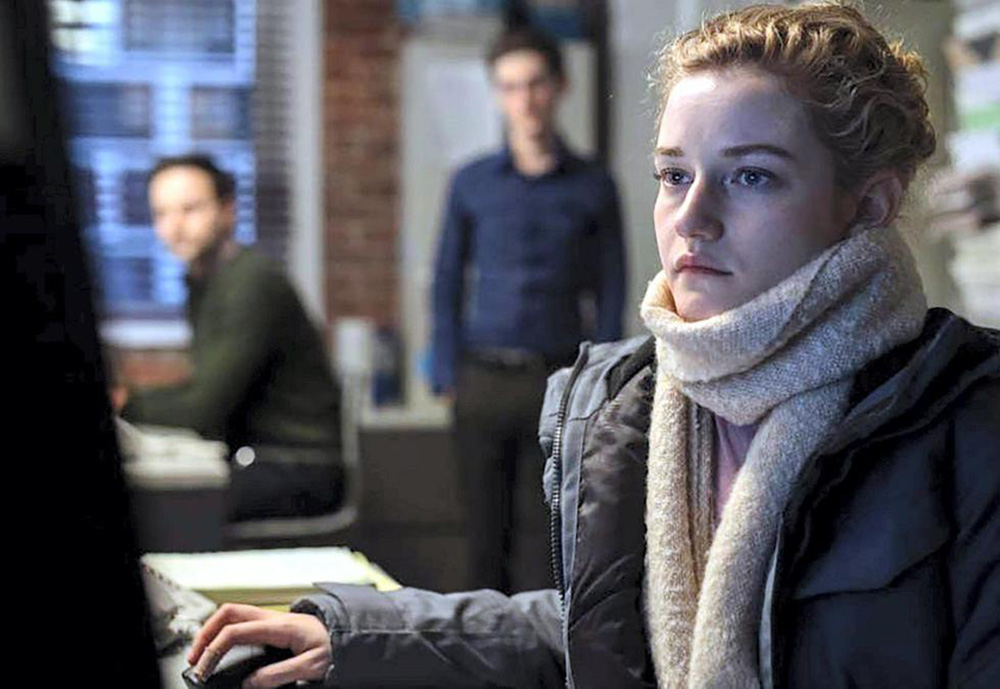I have a confession to make: it was really weird how the Harvey Weinstein allegations, the Time’s Up movement, and Kitty Green’s film, “The Assistant,” all came out at around the same time—the 2018-19 mark. It’s not that I don’t believe the women. I know I’m not alone in asking the troubling question: why did everyone wait so long? I know the answer to the question and I don’t like it. Neither will you.
Way back in the late 1990s-early 2000s, a story broke in one of the major magazines that I subscribed to about the toxic culture/workplace environment of the production company Miramax, headed up by the Weinstein brothers (Bob and Harvey). The article was based on an upcoming book. Then, after I cleaned or my mom cleaned or both, I could never find the article and the issue of the magazine that it was in again. I combed through every bookstore for it to no avail. A similar thing happened with that upcoming book. It had been strangely postponed indefinitely, with no explanation. Had I imagined the story and the book? No, not at all. But that’s exactly what the powers that be wanted me to think. The story and the book had been killed.
One of the things that “The Assistant” points out very well is that whether it’s corporate America in one of the major cities you live in and work in in NYC or in Hollywood, the powers that be really, really don’t want you complaining about bad behavior in the workplace. It’s bad for business. So they’d prefer that—no actually, you’d better—just leave well enough alone. If business is thriving and you’re being paid well in a job straight out of college and will be able to pay off your student loans quickly so that you’ll eventually get to do what you love, then what’s the problem? After all, you don’t want to bite the hand that feeds you, right?!
The film is an excessive exercise in sadism. It was a very unpleasant 87 minutes that felt longer. We’re introduced to our protagonist—or might I say more eloquently—our “supposed protagonist,” Jane (aptly played by Julia Garner). She’s fresh out of college and hopes to be a film producer one day. So, in order to gain some experience, she works as an assistant to a well-known entertainment mogul. It’s all so depressing and so familiar. She’s picked up before the sun is even out, on a cold, winter day, by an impersonal driver in front of her crappy house (They usually are when you’re right out of college.). She’s in the office before anyone else, robotically turning on all of the lights in the sterile, soul-sucking workplace with muted tones. No one dares to dress in a vibrant or flashy way. Everyone is understated and compliance is essential to this movie executive thriving.

So, what does it take for a movie executive to thrive and for his life to run more smoothly? Quite a lot, including cleaning a stain off of the sofa (employees will later joke uncomfortably not to sit there.), helping his Spanish housekeeper to get the vacuum to work when she doesn’t speak the language, fielding his wife’s calls about his cheating and him cancelling her credit cards, taking verbally abusive phone calls from him about what a horrible job she is doing and how useless she is, and typing up apology letters to him.
This is always with the help of two male staff members, who hover around her and guide her in saying thanks for the opportunity and promise to never let him down again. These are some of the most effective and quiet moments of the film that subtly point out that it takes the help of like-minded employees to see to it that this behavior flourishes. It’s terrible and we always hope that she’ll break away from her fellow male employees and tell the boss to f&$k off, but she never does.
Another important task is preparing young women to go in and “audition” for him—as she makes endless photocopies of their headshots and lets them rudely and disdainfully throw their fancy coats on her. The film poses the silent and searing question: who’s being humiliated more—the women auditioning for her boss, this producer—or her? Or maybe she deserves it on some level. After all, she is ushering these young women in to him, like lambs to the slaughter. We’re unsure. And, although we really wish that the laundry list ended there, it never does when it comes to toxic behavior.
Garner does a wonderful job in her economical performance, fraught with nuances, and she’s perfect in the role. The way her eyes well up with tears and she quickly and desperately fights them back and lightly clutches both sides of her head as the phone rings is amazing. The fear is real and unspoken. It’s like the ringing is straight out of a horror movie. We, along with her, have come to dread those awful phone calls from her boss and the people in his life. And we never see him. We just hear about the horrible things he’s doing and his berating voice so that the worst is left to our imaginations. It also brilliantly communicates how these kinds of men are able to be so successful—by remaining offscreen, behind closed doors, in the shadows.

There are two more moments in the film when we hope she’ll speak out—one is at the employment agency that has placed her at this current job and the recruiter is gaslighting her and distorting what she said, and another when she’s talking to her father and doesn’t have the heart to tell him around his birthday that the job is going awful. She cowers in both instances and it is clear that she feels trapped.
Horrified, we realize how bad behavior was allowed to thrive and continue on for so long. The women who initially came forward were bullied or felt too ashamed to continue and they caved under pressure. Think of how many times this occurred with these women who eventually came forward. The amount is staggering. It does, indeed, take a village.
And that’s the problem with this film. We’ve been here a gazillion times before and we know it by heart. Can we say something new and give our protagonist options—even if she’s in a crappy situation? If we don’t start teaching our young women growing up in the world today the importance of self-preservation, the human spirit, and individuality, then how will these characteristics ever be able to thrive and prevail? The structure will just continue to be rotten from the very core on out.


